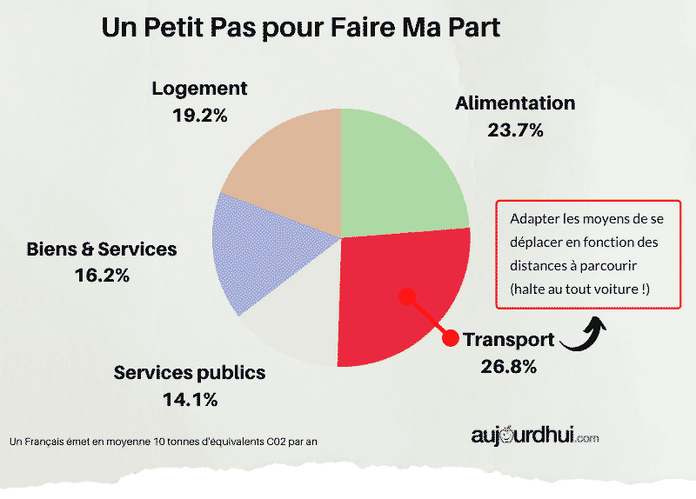In France, the individual car emits more greenhouse gases than all other modes of transport combined. It represents more than 15% of total emissions in our territory. However, 2/3 of the French consider it essential. So how can we succeed in reducing our transport CO2 emissions?
A third of greenhouse gases emitted in France and 80% of pollution (nitrogen oxides, fine particles, volatile organic compounds, etc.) are due to road transport.
Despite the development of the electric vehicle, road transport still depends on more than 90% of oil.
One small step to do your part
Can we reasonably hope to reduce our CO emissions2 transport in the coming years? Yes, if we do all efforts to change behavior…
I explain to you why three arguments :
- In France, more than half of trips are less than 5 kilometers and 80% of them are done by car. There is considerable transfer potential from car to bike and the electrically assisted bicycle over these short distances.
- If the car is essential to you, it is in your interest, when you change vehicle, to move towards a small electric city car. Manufacture and use included, it emits 55% CO2and less than an average thermal car (0.96 tonnes of CO2e against 2.2 tonnes per 10,000 km).*
- For long journeys, keep in mind that the train generates between three and five times less CO2and only one car per person transported.
If you want to do your part, you can try to organize yourself over the next few years to adapt your means of transport according to the distances. For example (these are just examples): walking or cycling for short journeys, the electric bike or a small electric city car for daily journeys, public transport (when they exist) or carpooling to go to work and the train for long distances.

The car is essential, SUVs much less!
A study IPSOS of July 2019 showed that 87% of French people use their car for at least one of their daily trips: going to work, shopping, practicing their hobbies or even going to the doctor.
It is therefore no question of doing without vehicles individuals at this stage. The population is not ready for it even if (this is a figure that should be noted) half of the journeys are less than 5km.
But the first problem is the undeniable success of SUVs, which have represented more thana third of registrations in the European Union in 2021. Larger and heavier than sedans, these vehicles are less aerodynamicconsume more fuel and emit more greenhouse gases. With such vehicles, it is impossible to reach the European target of 95 g CO2/km. As a reminder: we are more at 112 g CO2/km today on average.
It will therefore not be possible to significantly reduce individual car journeys in 10 years. The first common-sense step would be to favor use over comfort and prestige. The important thing for people is to to be able to move and not necessarily to appear behind the wheel of a big and beautiful racing car.
We remember that the energy specialist Jean-Marc Jancovici had suggested a drastic measure to effectively reduce the unit consumption of vehicleswithout forcing people to completely give up their cars.
The aim is to encourage manufacturers and motorists to move towards 500 kg carsreaching 110 km/h top speedfor a 30 horsepower engine: a modern version of 2 CV hybrid capable of consuming only 2 liters per 100 at most.
As in France, electricity is mostly low-carbon. A 100% electric car emits much less than a gasoline or diesel vehicle, provided that its weight is as low as possible. Small electric city cars therefore have a promising future.
Mobility is now at the heart of discussions. So how should we now consider our daily trips? The most ecological solutions depend, each time, on the distance to be covered, the number of passengers per vehicle and the nature of the journey to be made.
Walking and cycling for short trips
For short trips: walking and cycling seem to make a lot of sense. But in France, the bicycle represents only 3% of trips (especially in the city) against 10% in Germany and 28% in the Netherlands. The objective of the public authorities is to reach 9% in 2024. Some large cities have already paved the way, such as Strasbourg (16% of journeys made by bicycle), Grenoble (15%) and Bordeaux (12%).

the bike planlaunched at the end of 2018, has several objectives:
- Accelerate the development of cycle paths.
- Create spaces reserved for cyclists at traffic lights.
- Make it compulsory to mark bicycles to limit theft, concealment and trafficking.
- Financially support employees who cycle to work (up to €400/year).
- Promote cycle networks, self-service bicycles, etc.
- Develop functional infrastructure (bicycle garages, cycle paths, transport of bicycles on the train.
Public transport to go to work
For home-to-work journeys, public transport (when available) are less polluting solutions than the car. To facilitate access to stations, developments are being carried out in a good number of towns: installation of secure parking lots for bicycles near the station, self-service scooters and bicycles, promotion of carpooling in the event of a clear absence of public transport.
Urban transport CO2 emissions
| Tram | 3.3 |
| Metro | 3.8 |
| Transilien | 5.8 |
| Bus | 132 |
| 2 motorized wheels | 111 |
| Peri-urban passenger cars | 162 |
| Urban passenger cars | 206 |
The train for long journeys
When possible, the train is always a better option than the car for long distances. In addition to being less energy intensive, it emits few pollutants when, as in France, it is powered by electricity. The particles emitted by train braking are low compared to road traffic. Upon arrival, the train generates between three and five times less CO2 than a car per person transported.
In addition, the train contributes to a more sustainable and harmonious development of territories. For example, a railway takes up half the space of a road. For a high-speed line, this is 35% less space than a two-lane road, not to mention that it can carry more passengers !
CO2 emissions long distance transport
| TGV | 3.2 |
| Main line trains | 10.8 |
| Cars | 58.5 |
| Passenger cars (long distance) | 85.5 |
| planes | 145 |
* Study of Hellocarbo.com

















